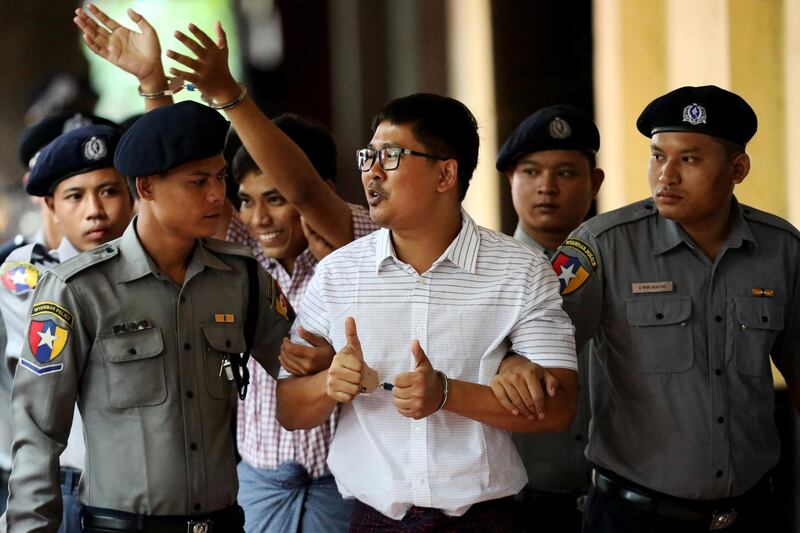A Myanmar judge delayed the verdict that had been expected on Monday against two Reuters journalists accused of possessing official documents illegally in a case that has drawn attention to the faltering state of press freedom in the troubled South East Asian nation.
The verdict was postponed to September 3. The judge who announced the delay did not give a reason.
Kyaw Soe Oo and Wa Lone have pleaded not guilty to violating Myanmar's colonial-era Official Secrets Act, which carries a penalty of up to 14 years in prison. They were arrested in December and have been detained since then after being denied bail.
The reporters contend they were framed by police while reporting on Myanmar's brutal crackdown on Rohingya Muslims in the western state of Rakhine that has drawn international condemnation.
About 700,000 Rohingya fled to neighbouring Bangladesh after the crackdown began last August, and Myanmar's army has been accused by human rights groups and UN experts of committing massive human rights violations amounting to ethnic cleansing, and possibly genocide.
_________
Read more:
The Myanmar journalists risking their lives to report on the Rohingya’s plight
Jailed Reuters journalists to testify in Myanmar court
Myanmar court charges Reuters reporters with official secrets offence
Editorial: Journalists’ protection is vital in getting to the truth
_________
The two reporters for the international news agency had been investigating the killing of 10 Rohingya by soldiers, police and Buddhist civilians. In a rare instance of security forces being punished for extra-judicial killings, Myanmar's government later announced that seven soldiers had been sentenced to 10 years in prison with hard labour for the killings.
The government has denied any widespread abuses but continues to restrict access in Rakhine. It insists the crackdown was a justified response to co-ordinated surprise attacks by Rohingya militants that killed dozens of security personnel.
Kyaw Soe Oo, 28, and Wa Lone, 32, both testified to suffering harsh treatment during their initial interrogations. They lost several appeals for bail to be set.
The court also formally charged the reporters even though a police captain called as a prosecution witness during an initial phase of the trial testified that his commander had ordered that documents be planted on the journalists to entrap them.
After his testimony, the police whistleblower, Moe Yan Naing, was jailed for a year for violating police regulations and his family kicked out of police housing.
The documents presented as evidence in court appeared to be neither secret nor sensitive. The reporters testified they did not solicit or knowingly possess any secret documents.
"The evidence before the court is clear: Wa Lone and Kyaw Soe Oo are two honest reporters who did not commit a crime. Imprisoning them for even one more day would be unlawful retribution for their truthful and important journalism," Reuters said after the trial's closing arguments were delivered last week.
The case has dissipated hope for a new era of freedom of expression under the government of Aung San Suu Kyi, whose National League for Democracy party came to power in 2015 after five decades of military control. The case of the Reuters reporters is only the latest under her administration where the courts have aggressively pursued legal charges against dozens of journalists, along with other attempts to suppress and discredit the media.
Earlier this month, US Secretary of State Mike Pompeo called on Myanmar to immediately release the two Reuters journalists.
Mr Pompeo tweeted that he had raised US concerns about the reporters' detainment when he met Myanmar officials on the sidelines of a regional gathering in Singapore.





